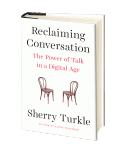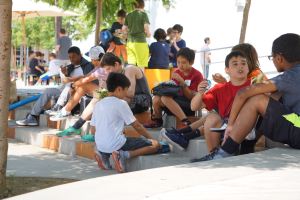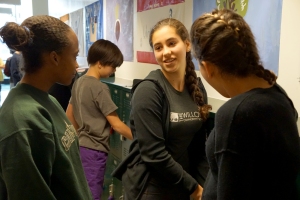Technology has changed our world and our lives. The benefits are endless. It even assists with revolutions and, of course, in any crisis. Just witness the recent terrorist attacks in Paris where Parisians launched the hashtag on Twitter, #PorteOuvert (DoorOpen) to offer shelter to those in need, who could simply follow the tweets on their cell phones to find refuge. Smart phones, laptops, iPads, all these devices and the always present, turned-on, mobile connectivity unite us and isolate us presenting social challenges–especially for our younger children, who are growing up with the ever-present, ever-tempting cellphone connection.
Informate, a mobile measurement firm, in March 2015 reported that during January 2015, Americans spent 4.9 hours per day on their smartphones and sent an average of 32 texts per day. Teens are thought to spend more than the average time. The 2015 Pew Research Center Study said that, “89 percent of cellphone owners said they had used their phones during the last social gathering they attended.”
In a recent New York Times article entitled Stop Googling, Let’s Talk by Sherry Turkle, author of Reclaiming Conversation  and Alone Together, Why We Expect More from Technology and Less from Each Other, writes, “What has happened to face-to-face conversation in a world where so many people say they would rather text than talk? . . . Studies of conversation both in the laboratory and in natural settings show that when two people are talking, the mere presence of a phone on a table between them or in the periphery of their vision changes both what they talk about and the degree of connection they feel. People keep the conversation on topics where they won’t mind being interrupted. They don’t feel as invested in each other. Even a silent phone disconnects us.”
and Alone Together, Why We Expect More from Technology and Less from Each Other, writes, “What has happened to face-to-face conversation in a world where so many people say they would rather text than talk? . . . Studies of conversation both in the laboratory and in natural settings show that when two people are talking, the mere presence of a phone on a table between them or in the periphery of their vision changes both what they talk about and the degree of connection they feel. People keep the conversation on topics where they won’t mind being interrupted. They don’t feel as invested in each other. Even a silent phone disconnects us.”
Turkle continues with the idea that this disconnection is an assault on empathy, intimacy, and deep conversations, as well as solitude.
Ann Levit, a Willows parent, asked her daughter, Joby Levit, a current eighth grade student, to read Ms. Turkle’s article and write down her reflections regarding it. Joby wrote this thoughtful essay in response:

Joby Levit
The report “Stop Googling. Let’s Talk.” written by Sherry Turkle is about how my generation of pre-teens, teenagers, and even some adults’ social skills are stifled by electronics and social media. I wish I could disagree with that and say it’s not true, but I have to be honest with myself: this writer is 100% correct. I try to tell myself that I shouldn’t be on my phone, but now it’s just a bad habit, like biting your nails or forgetting to brush your teeth.
In this article, Sherry Turkle talks about the technicalities, logic, and science behind the reason people use their phones while at, for instance, the dinner table. Look, I’m only thirteen, and science has never been my best subject, but the parts of this paper I was able to understand are completely true. The writer mentions that we use our phones at a table full of friends because we’re so obsessed with our mobile devices that we can’t help but check them all the time. That may be true for grown-ups and college students, which was the age group this article focused on, but I know that for me, it’s a bit different. I, personally, am a bit an awkward person. I tried to avoid admitting that, but I think my friends and family can all agree that that’s true. When there are gaps in a conversation, the easiest thing to do to avoid awkwardness is to take out my phone and show my friend(s) something funny on it to create conversation. And I know as I’m writing this that my mom will probably get mad at me when I read that fact to her, but I’m sorry, it’s true! Like Rebel Wilson said in Pitch Perfect, “I guess I’m not really living if I’m not 100% honest.” J
All right, enough about the article. My essay, my opinion! To the people my mother might send this to, my mother, if you may not know, is the biggest phone police ever. I mean I had to write a persuasive essay to get a Snapchat. And I know she’s just looking out for me, but we can all admit she’s a bit crazy when it comes to this stuff. In the middle of sixth grade, my mom gave me the privilege of creating an Instagram account for myself. If I was on it in the morning, she got mad. If I was on it in the car, she got mad. If I was on it after school, she was totally fine with it! Just kidding, you can guess how she felt about it. After a few years with social media, having recently added Snapchat and Pinterest to my phone, I get her point. She was trying to prevent me from becoming one of the people my generation has become. It’s time to face the facts: we are addicted to our phones. You might not think it’s bad, but trust me, you’re going to grow up and then get to high school and college not knowing how to verbally/physically connect to people. My mom thinks I have it bad, but I know people who have it a lot worse.
So get ready, parents. I can’t believe I’m saying this, but try shutting off all screens at 9:00 tonight. All you really need it for is your alarm in the morning. And what is that alarm set for? Certainly not to check your Instagram feed. That loud, annoying beeping sound that wakes you up in the morning is there to get you up for school, where you can get an education you can’t learn from Facebook or Twitter. Trust me, it’s going to be hard, but I promise you, you can live and thrive without your phone. Unplug! And don’t hesitate to tell your community about it too! We can all join in to help create a better tomorrow.
Some great insights for all of us! What is the answer to all of this connectivity? BALANCE and CONVERSATION.  Balance is a word you hear often around The Willows. We are a balanced, progressive school. Tradition is balanced with innovation. Academics, the arts, athletics, and social emotional development are balanced in our educational program.
Balance is a word you hear often around The Willows. We are a balanced, progressive school. Tradition is balanced with innovation. Academics, the arts, athletics, and social emotional development are balanced in our educational program.
Conversation is also extremely important and valued at The Willows, and is also at the very heart of technology and collaboration.  Questioning, deep critical thinking, and creative inquiry, and sharing this as a group, is accentuated in all our classrooms. Walk through our hallways and glance in any classroom and you will see that conversation is thriving and technology is integrated effectively and appropriately.
Questioning, deep critical thinking, and creative inquiry, and sharing this as a group, is accentuated in all our classrooms. Walk through our hallways and glance in any classroom and you will see that conversation is thriving and technology is integrated effectively and appropriately.
The balance of technology and personal interaction is a key to the issue of connectivity. As our eighth grade student Joby so beautifully put it: Unplug! And don’t hesitate to tell your community about it too! We can all join in to help create a better tomorrow.




 and
and 
 Balance is a word you hear often around The Willows. We are a balanced, progressive school. Tradition is balanced with innovation. Academics, the arts, athletics, and social emotional development are balanced in our educational program.
Balance is a word you hear often around The Willows. We are a balanced, progressive school. Tradition is balanced with innovation. Academics, the arts, athletics, and social emotional development are balanced in our educational program. Questioning, deep critical thinking, and creative inquiry, and sharing this as a group, is accentuated in all our classrooms. Walk through our hallways and glance in any classroom and you will see that conversation is thriving and technology is integrated effectively and appropriately.
Questioning, deep critical thinking, and creative inquiry, and sharing this as a group, is accentuated in all our classrooms. Walk through our hallways and glance in any classroom and you will see that conversation is thriving and technology is integrated effectively and appropriately.